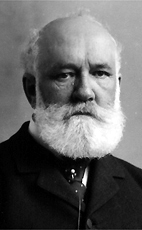The Progressive Party of Canada was a federal-level political party in Canada in the 1920s until 1930. It was linked with the provincial United Farmers parties in several provinces, and it spawned the Progressive Party of Saskatchewan, and the Progressive Party of Manitoba, which formed the government of that province. The Progressive Party was part of the farmers' political movement that included federal and provincial Progressive and United Farmers' parties.

The Patrons of Industry in Canada were based on the Patrons of Industry of Michigan that had formed in 1889. It was dedicated to upholding and encouraging the moral, social, intellectual, political and financial situation of farmers and to preserve the way of life that existed in farming communities in the late nineteenth century against encroaching industrialization. It cooperated with the urban labour movement to address the political frustrations of both groups with big business.

The Progressive Conservative Party of New Brunswick is a centre-right, conservative political party in the Canadian province of New Brunswick. The party has its origins in the pre-Canadian confederation Conservative Party that opposed the granting of responsible government to the colony. It has historically followed the Red Tory tradition. The Progressive Conservative Party currently leads the provincial government since 2018 under Premier Blaine Higgs.

Andrew George Blair was a Canadian politician in New Brunswick, Canada. He served as Premier for 13 years and 136 days, the second-longest tenure in the province's history, behind Richard Hatfield's tenure of 16 years and 310 days.
In Canada, a third party has two distinct meanings in the political process. For legal and official purposes, a "third party" refers to agents other than candidates and voters who participate in elections. For example, campaign advertisements funded by groups other than the parties and candidates running may be called "third party advertising". During a campaign period, registered third parties must declare their sources of funding and are restricted in the amounts they can spend in advocating for or against a party or candidate. See Harper v. Canada for the Supreme Court decision upholding the constitutionality of these restrictions in the Canada Elections Act.
Member of the Legislature (ML), is a representative elected by the voters of a constituency to the legislature or legislative assembly of a sub-national jurisdiction.
Dale Allison Graham is a former politician in New Brunswick, Canada. He served as an MLA from 1993 to 2014, as Speaker of the Legislative Assembly of New Brunswick from 2010 to 2014, and as a member of the provincial cabinet from 1999 to 2006.

The 53rd New Brunswick Legislative Assembly was created following a general election in 1995 and was dissolved on May 8, 1999.
The 1912 New Brunswick general election was held on 20 June 1912, to elect 48 members to the 33rd New Brunswick Legislative Assembly, the governing house of the province of New Brunswick, Canada. The election was held before the adoption of party labels.
The 1908 New Brunswick general election was held on 3 March 1908, to elect 46 members to the 32nd New Brunswick Legislative Assembly, the governing house of the province of New Brunswick, Canada. The election was held before the adoption of party labels.
The 1903 New Brunswick general election was held on 3 March 1903, to elect 46 members to the 31st New Brunswick Legislative Assembly, the governing house of the province of New Brunswick, Canada. The election was held before the adoption of party labels.
The 1899 New Brunswick general election was held on 18 February 1899, to elect 46 members to the 30th New Brunswick Legislative Assembly, the governing house of the province of New Brunswick, Canada. The election was held before the adoption of party labels.
The 1892 New Brunswick general election was held in October 1892, to elect 41 members to the 28th New Brunswick Legislative Assembly, the governing house of the province of New Brunswick, Canada. The election was held before the adoption of party labels.
The 1890 New Brunswick general election was held on 20 January 1890, to elect 41 members to the 27th New Brunswick Legislative Assembly, the governing house of the province of New Brunswick, Canada. The election was held before the adoption of party labels.
The 1882 New Brunswick general election was held in June 1882, to elect 41 members to the 25th New Brunswick Legislative Assembly, the governing house of the province of New Brunswick, Canada. The election was held before the adoption of party labels.
The 1878 New Brunswick general election was held in June 1878, to elect 41 members to the Post-Confederation 24th New Brunswick Legislative Assembly, the governing house of the province of New Brunswick, Canada. The election was held before the adoption of party labels. John James Fraser was appointed premier of New Brunswick on May 4, 1878, following the resignation of George Edwin King, and led his government into the election weeks later.
The 1874 New Brunswick general election was held in May and June 1874, to elect 41 members to the 23rd New Brunswick Legislative Assembly, the governing house of the province of New Brunswick, Canada. The election was held before the adoption of party labels.
The 1870 New Brunswick general election was held in June and July 1870, to elect 41 members to the 22nd New Brunswick Legislative Assembly, the governing house of the province of New Brunswick, Canada. The election was held before the adoption of party labels, and was the first since New Brunswick joined the Canadian Confederation in 1867.
James Robert Jewell was an Australian politician. He was a Labor Party member of the Victorian Legislative Assembly from 1910 to 1949, representing the electorate of Brunswick. He was the party whip from 1924 to 1949. Jewell railway station on the Upfield railway line was renamed in his honour.

The 1898 New South Wales colonial election was held on 27 July 1898 for all of the 125 seats in the 18th New South Wales Legislative Assembly and it was conducted in single-member constituencies with a first past the post voting system. Section 23 (1) of the Parliamentary Electorates and Elections Act of 1893 conferred a right to vote on 'every male person, being a natural born [British] subject, who shall have resided or had his principal place of abode in New South Wales for a continuous period of one year'. The 18th parliament of New South Wales was dissolved on 8 July 1898 by the Governor, Lord Hampden, on the advice of the Premier, George Reid.




